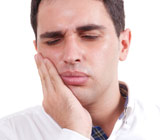
Chronic pain and reduced function of the jaw joints, muscles and other surrounding tissues is generally known as a temporo-mandibular joint disorder (TMJD or TMD). It’s also possible that sufferers of TMD may also experience chronic pain in other parts of the body.
TMD affects from 10 million to 36 million American adults, mostly women of childbearing age. Although the exact causes are still elusive, most researchers believe this family of conditions arises from a combination of gender, genetic, environmental and behavioral factors. This may also hold the key to its connection with other painful conditions in the body.
About two-thirds of patients with some form of chronic jaw pain or disability also suffer from three or more similar medical conditions, including fibromyalgia, chronic fatigue syndrome, rheumatoid arthritis, headaches or sleep disturbances. Investigating the connections between these conditions is a fertile area for developing treatment strategies that would benefit all of these associated conditions.
In the meantime, there are both thermal and surgical treatments for alleviating and managing pain associated with TMD. About 90% of TMD patients respond well to thermal treatments, including hot and cold compresses applied to the jaw area and hot baths. Surgical treatment, however, has a mixed result: some studies show only a third of those undergoing surgical procedures experience noticeable pain relief and restored function and nearly half indicate worse symptoms after the surgery.
The best approach is to begin with an examination by your primary physician or specialist to be sure you are not suffering from a medical condition mimicking the symptoms of TMD. If this should eventually lead to a diagnosis of TMD, you should first try thermal techniques with over-the-counter pain relievers to ease the symptoms. A diet with softer foods that don’t require strenuous chewing may also prove helpful.
If you receive a recommendation for extensive bite treatment or surgery, you should discuss this thoroughly with your dentist, or even seek a second opinion. Surgical treatments in particular are not reversible and the results may not be favorable.
For more information on TMD and networking opportunities with other patients, be sure to visit the TMJ Association (www.tmj.org) on the Web.
If you would like more information on chronic jaw pain, please contact us or schedule an appointment for a consultation. You can also learn more about this topic by reading the Dear Doctor magazine article “Chronic Jaw Pain and Associated Conditions.”
